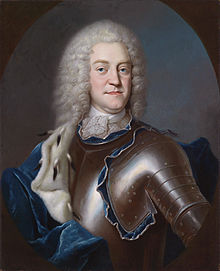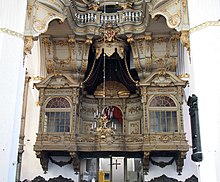Christian Ludwig II. (Mecklenburg)

Christian II. Ludwig, Duke of Mecklenburg [-Schwerin] (born November 15, 1683 in Grabow ; † May 30, 1756 in Schwerin ) was the (ruling) Duke of Mecklenburg in the Mecklenburg-Schwerin region .
Life

Christian Ludwig was born the third son of Duke Friedrich zu Mecklenburg (1638–1688) and Christine Wilhelmine von Hessen-Homburg (1653–1722) and was a nephew of the childless Duke Christian Ludwig I of Mecklenburg-Schwerin (1623–1692) . Christian Ludwig's older brother Friedrich Wilhelm (1675-1713) succeeded his uncle on June 21, 1692 as Duke. He died in 1713 and Christian Ludwig's second brother Karl Leopold took over the rule. Christian Ludwig II was an important promoter of spiritual and cultural life.
Rule of his brother Karl Leopold and execution of the Reich
His brother Karl Leopold, who followed Friedrich Wilhelm, tried to enforce sovereign, absolutist sovereignty with great severity against the knighthood and against Rostock, allied with them. So he asked the estates to grant him additional taxes in order to build up a standing army, then forced the Rostock council to renounce his privileges and ruthlessly enforced his tax claims against the knighthood. Mecklenburg-Schwerin was a staging area and theater of war during the Northern War, and with the help of a standing army, Karl Leopold intended to end the stay of foreign troops in Mecklenburg-Schwerin. This created a sharp contrast between Karl Leopold and the estates. After complaints from the Mecklenburg unified estates before the head of the empire against Karl Leopold's breaches of law and autocratic efforts, Emperor Karl VI. In 1717 the execution of the Reich was imposed on him. The director of the Lower Saxony Reich Circle, Elector Georg Ludwig von Hanover, was charged with carrying out the execution of the Reich . With the execution of the Reich, Andreas Gottlieb von Bernstorff was able to combine the interests of the Mecklenburg knighthood with the influence of a foreign power.
Seizure of power
The execution of the imperial execution took place in the spring of 1719. Karl Leopold left the country soon afterwards. The government in Mecklenburg-Schwerin was taken over by the Elector of Hanover and the King of Prussia. After the death of George I (1727) the execution of the Reich was lifted.
Christian II. Ludwig was finally installed as ruling duke by the Reichshofrat in Vienna in 1728 .
Christian II. Ludwig continued to struggle with the consequences. Eight offices were pledged to the elector of Hanover and four to the Prussian king. The political and administrative fragmentation of the country was thereby aggravated, the power of the duke was considerably restricted. The pledging of the four offices to Prussia did not end until 1787.
Karl Leopold tried to regain control of Mecklenburg-Schwerin in 1733, but failed. In 1748, Christian Ludwig II decided together with Adolf Friedrich III. the dissolution of the state of Mecklenburg. However, this failed because of the bitter resistance of the knighthood. Christian II. Ludwig then concluded the Land Constitutional Constitutional Comparison with the Estates in 1755 . This comparison of inheritance led to the consolidation of the power of the Mecklenburg knighthood and preserved the backwardness of the country until the end of the monarchy in Mecklenburg-Schwerin (1918).
Christian Ludwig II had Johann Friedrich Künnecke build a hunting lodge in Klenow, the predecessor of the later Ludwigslust Palace . He was buried with his wife in the Nikolaikirche in Schwerin .
progeny
On November 13, 1714, Duke Christian Ludwig married Princess Gustave Karoline (1694–1748), a daughter of Duke Adolf Friedrich II of Mecklenburg-Strelitz, in Schwerin . The marriage had five children:
- Friedrich (the Pious) (1717–1785), Duke of Mecklenburg [-Schwerin]
- Ulrike Sophie (1723–1813), 1728–1756 Abbess of the Rühn Monastery
- Ludwig , Hereditary Prince of Mecklenburg (1725–1778)
- Louise (* / † 1730)
- Amalie (born March 8, 1732 in Grabow; † September 24, 1775), canon of Herford
Awards
On April 30, 1737 Christian Ludwig was in Frederiksborg Palace by King Christian VI. accepted into the Danish Elephant Order.
In 1749 he sent the insignia of the Order of Saint Andrew the First Called of his brother Karl Leopold, who died in 1747, back to Russia, whereupon he himself was accepted into the order on December 11, 1749. His plan to found his own order did not come to fruition.
literature
- Hela Baudis: Portrait of Christian Ludwig II of Mecklenburg-Schwerin - on aspects of the image of the ruler in the 18th century . In: Mecklenburgische Jahrbücher 122 (2007), pp. 99–120.
- Ludwig Fromm: Christian II. Ludwig . In: Allgemeine Deutsche Biographie (ADB). Volume 4, Duncker & Humblot, Leipzig 1876, p. 170 f.
- Antje Koolman: The education of a prince. The training of Duke Christian Ludwig II in Grabow in Grabow, Wolfenbüttel, London and Rome . In: Mecklenburgische Jahrbücher 122 (2007), pp. 81–98.
- Heinz Maybaum: Christian Ludwig II. In: New German Biography (NDB). Volume 3, Duncker & Humblot, Berlin 1957, ISBN 3-428-00184-2 , p. 228 f. ( Digitized version ).
Web links
- Literature about Christian Ludwig II. (Mecklenburg) in the state bibliography MV
- Biographical data of Christian Ludwig
- Family tree of the House of Mecklenburg
swell
- ↑ Pecar, Andreas: Proceedings: Constitution and reality of life. The regional constitutional inheritance comparison of 1755 in his time, Rostock April 22-23, 2005
- ↑ 231. Award, see JHF Berlien: The Elephant Order and its Knights . Copenhagen 1846 ( digitized ). , P. 93 f.
- ↑ Georg Christian Friedrich Lisch : Aeltere meklenburg-Schwerinsche and Güstrowsche orders. In: Mecklenburgische Jahrbücher 7 (1842), pp. 216–224, here p. 220.
| predecessor | Office | successor |
|---|---|---|
| Karl Leopold |
Duke of Mecklenburg [-Schwerin] 1728–1756 |
Friedrich |
| personal data | |
|---|---|
| SURNAME | Christian Ludwig II. |
| ALTERNATIVE NAMES | Mecklenburg, Christian Ludwig II. Von (wrong name form) |
| BRIEF DESCRIPTION | Duke of Mecklenburg (-Schwerin) |
| DATE OF BIRTH | November 15, 1683 |
| PLACE OF BIRTH | Grabow (Elde) |
| DATE OF DEATH | May 30, 1756 |
| Place of death | Schwerin |

